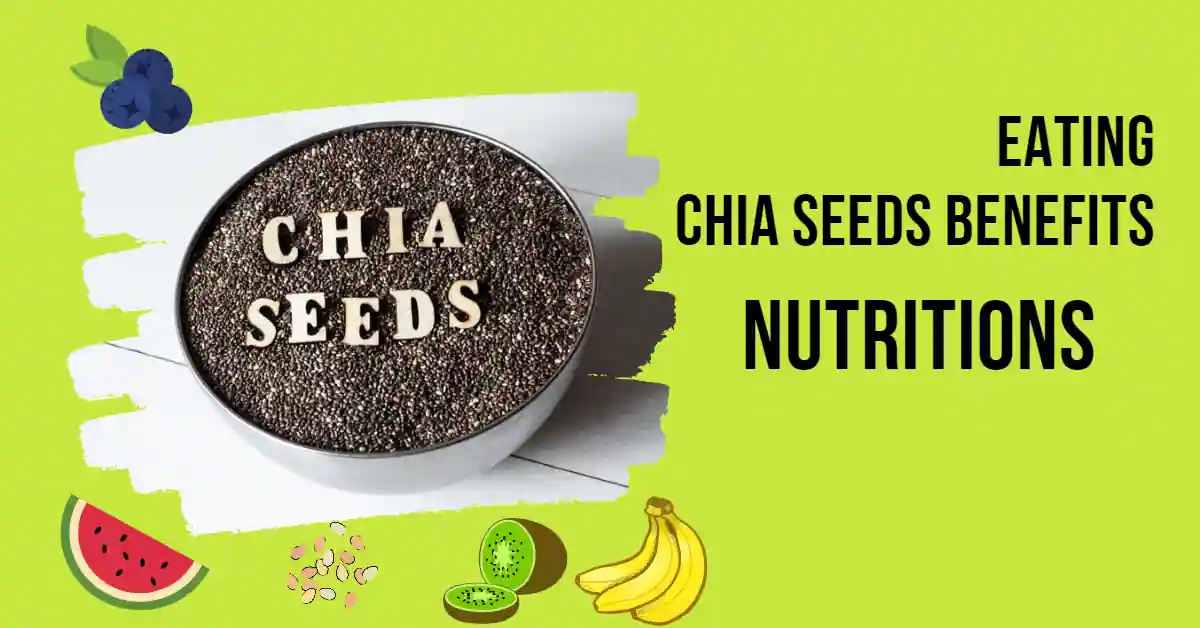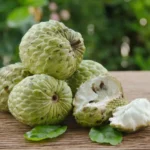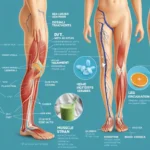Discover the incredible benefits of eating chia seeds benefits for optimal health and the nutritional value of just 1 tablespoon of chia seeds. Learn how these tiny seeds can boost energy, promote weight loss, improve digestion, and more.
Introduction-Eating Chia Seeds Benefits
Chia seeds have gained significant popularity recently due to their numerous health benefits. These tiny black seeds, derived from the Salvia hispanica plant, are packed with essential nutrients and offer a wide range of advantages for overall well-being. This comprehensive guide will explore eating chia seeds’ advantages, and how they might improve your health.
Eating Chia Seeds Benefits
1. The Nutritional Powerhouse: An Overview of Chia Seeds
Chia seeds are a treasure trove of essential nutrients, making them a superfood that can significantly contribute to overall health. These small seeds are an excellent source of fiber, omega-3 fatty acids, protein, antioxidants, vitamins, and minerals. Just two tablespoons of chia seeds provide powerful nutrients, making them an ideal addition to a balanced diet.
2. The Role of Chia Seeds in Weight Management
Many people turn to chia seeds as part of their weight management strategy. Chia seeds’ high fiber content helps increase satiety, keeping you feeling full for longer periods. Additionally, chia seeds absorb water, expanding in your stomach and reducing hunger pangs. Incorporating chia seeds into your diet can curb cravings and support healthy weight loss or maintenance.
3. Promoting Digestive Health with Chia Seeds
Chia seeds can greatly advance digestive health, essential for general well-being. Chia seed fiber functions as a prebiotic, feeding the good microorganisms in your stomach. It improves regular bowel motions and aids in the prevention of constipation. You can support a healthy digestive system by incorporating chia seeds.
4. Strengthening Bone Health and Preventing Osteoporosis
Maintaining strong and healthy bones is essential, especially as we age. Chia seeds are a rich calcium, magnesium, and phosphorus source, all vital for bone health. When consumed regularly, chia seeds can help prevent osteoporosis and maintain healthy bone density, lowering the risk of fractures and enhancing overall skeletal strength.
5. Chia Seeds and Heart Health: An Ideal Combination
The importance of cardiovascular health is highlighted by the fact that heart disease is the leading cause of mortality globally. Chia seeds offer several benefits for heart health, primarily due to their high omega-3 fatty acid content. Omega-3s help reduce inflammation, lower cholesterol levels, and regulate blood pressure. You can support a healthy heart by incorporating chia seeds into your diet.
6. Managing Blood Sugar Levels with Chia Seeds
Maintaining stable blood sugar levels is crucial, particularly for individuals with diabetes or those at risk of developing the condition. Chia seeds can slow down digestion, preventing blood sugar spikes. The fiber content in chia seeds also aids in regulating blood glucose levels. Including chia seeds in your meals can contribute to better blood sugar management.
7. Boosting Energy and Enhancing Athletic Performance
For individuals leading an active lifestyle or engaging in regular exercise, chia seeds can be a valuable addition to their diet. These seeds are rich in carbohydrates, healthy fats, and protein, providing a sustainable energy source. Chia seeds also help with hydration, absorbing water and releasing it slowly during physical activity. Incorporating chia seeds into your pre- or post-workout routine can enhance athletic performance.
8. Improving Brain Function and Cognitive Abilities
Cognitive health is essential for maintaining mental acuity and preventing age-related decline in brain function. Chia seeds contain omega-3 fatty acids, antioxidants, and other nutrients that support brain health. These compounds help reduce inflammation, protect brain cells from damage, and enhance cognitive abilities. Including chia seeds in your diet can nourish your brain and support optimal mental function.
9. Chia Seeds as a Natural Anti-Inflammatory Agent
A normal body reaction to injury or infection is inflammation, but chronic inflammation can lead to various health issues. Chia seeds possess anti-inflammatory properties, primarily due to their high omega-3 fatty acid content. Regular consumption of chia seeds can help reduce inflammation, lowering the risk of chronic diseases such as arthritis, heart disease, and certain cancers.
10. Nourishing Skin and Promoting a Youthful Appearance
Achieving healthy and radiant skin is a goal for many individuals. Chia seeds can contribute to nourishing your skin from within. Antioxidants in chia seeds shield the skin from free radical damage, maintaining its youthful appearance. Furthermore, the omega-3 fatty acids in chia seeds help maintain skin hydration and elasticity, reducing the signs of aging.
11. Chia Seeds and Eye Health: A Visionary Superfood
Taking care of your eyes is essential for maintaining good vision and preventing age-related eye conditions. Chia seeds contain nutrients such as vitamins A and C and antioxidants supporting eye health. These compounds help protect the eyes from oxidative stress and age-related degeneration. Regularly consuming chia seeds can contribute to maintaining healthy vision as you age.
12. Chia Seeds for Healthy Hair and Stronger Nails
Healthy hair and strong nails are often indicators of overall well-being. Chia seeds provide essential nutrients that promote hair and nail health. Chia seeds include omega-3 fatty acids, which help nourish hair follicles, promoting healthy hair growth and preventing dryness and breakage. The protein content in chia seeds also contributes to stronger nails and prevents brittleness.
13. Enhancing Immune Function with Chia Seeds
Maintaining a strong immune system is crucial for preventing illness and staying healthy. Chia seeds contain essential nutrients like vitamins C, E, and Zinc, supporting immune function. These nutrients help protect against oxidative stress, strengthen the immune response, and promote overall immune system health. You may naturally enhance your immune system by incorporating chia seeds into your diet.
14. Chia Seeds and Cancer Prevention
Preventing cancer is a top priority for many individuals, and certain dietary choices can contribute to reducing the risk. Chia seeds are rich in antioxidants, which help protect the body against cellular damage and the formation of cancerous cells. The fiber in chia seeds also aids in removing toxins from the body. While chia seeds alone cannot prevent cancer, they can be a valuable addition to an overall healthy lifestyle.
15. Supporting Healthy Pregnancy with Chia Seeds
During pregnancy, proper nutrition is crucial for the health of both the mother and the developing baby. Chia seeds can provide essential nutrients needed during this critical time. The omega-3 fatty acids in chia seeds support fetal brain development, while the calcium content contributes to forming strong bones and teeth. Pregnant women can incorporate chia seeds to support a healthy pregnancy.
16. Chia Seeds and Breastfeeding: A Nutrient-Packed Food
Breastfeeding mothers require adequate nutrition to support their health and the production of breast milk. Chia seeds can be an excellent addition to a breastfeeding mother’s diet. The omega-3 fatty acids and protein in chia seeds support the mother’s overall well-being, while the nutrients are passed on to the baby through breast milk. Including chia seeds in meals and snacks can help breastfeeding mothers meet their nutritional needs.
17. Chia Seeds for Children: Nurturing Their Growth
Ensuring children receive proper nutrition is vital for their growth, development, and overall health. Chia seeds can be a nutritious addition to a child’s diet. Chia seeds’ fiber, protein, and essential nutrients support healthy growth and development. However, it is important to introduce chia seeds gradually and ensure they are consumed safely and appropriately based on the child’s age and dietary needs.
Also Read- Get Naturally Glowing Skin
Incorporating Chia Seeds into a Vegan or Vegetarian Diet
Vegans and vegetarians often seek alternative sources of essential nutrients in animal products. Chia seeds can benefit a vegan or vegetarian diet due to their nutrient profile. They are a rich source of plant-based protein, omega-3 fatty acids, iron, calcium, and other vital nutrients. Individuals following a vegan or vegetarian lifestyle can meet nutritional requirements by including chia seeds in meals and snacks.
Chia Seeds and Gluten-Free Diets: A Perfect Match
Individuals with gluten sensitivities or celiac disease must avoid gluten-containing grains. Chia seeds are naturally gluten-free, making them an excellent alternative to grains for individuals following a gluten-free diet. Chia seeds offer a nutrient-dense source of fiber, protein, and essential nutrients without the risk of gluten-related issues. Incorporating chia seeds into gluten-free recipes can enhance their nutritional value and texture.
Chia Seeds Nutrition 1 Tablespoon: Exploring the Power of Tiny Seeds
Chia seeds have gained immense popularity recently due to their numerous health benefits and nutritional value. These tiny seeds are packed with essential nutrients, making them valuable to a healthy diet. In this article, we will delve into the nutritional content of chia seeds, particularly focusing on their composition per tablespoon serving size. So, let’s explore the power of chia seeds and uncover their remarkable nutritional profile.
Chia Seeds Nutrition 1 Tablespoon: A Closer Look
Chia seeds are small, oval-shaped seeds from the Salvia hispanica plant, native to Central and South America. Despite their small size, these seeds are loaded with nutrients and are a fantastic source of vitamins, minerals, fiber, and omega-3 fatty acids. Let’s break down the nutritional content of chia seeds per tablespoon serving:
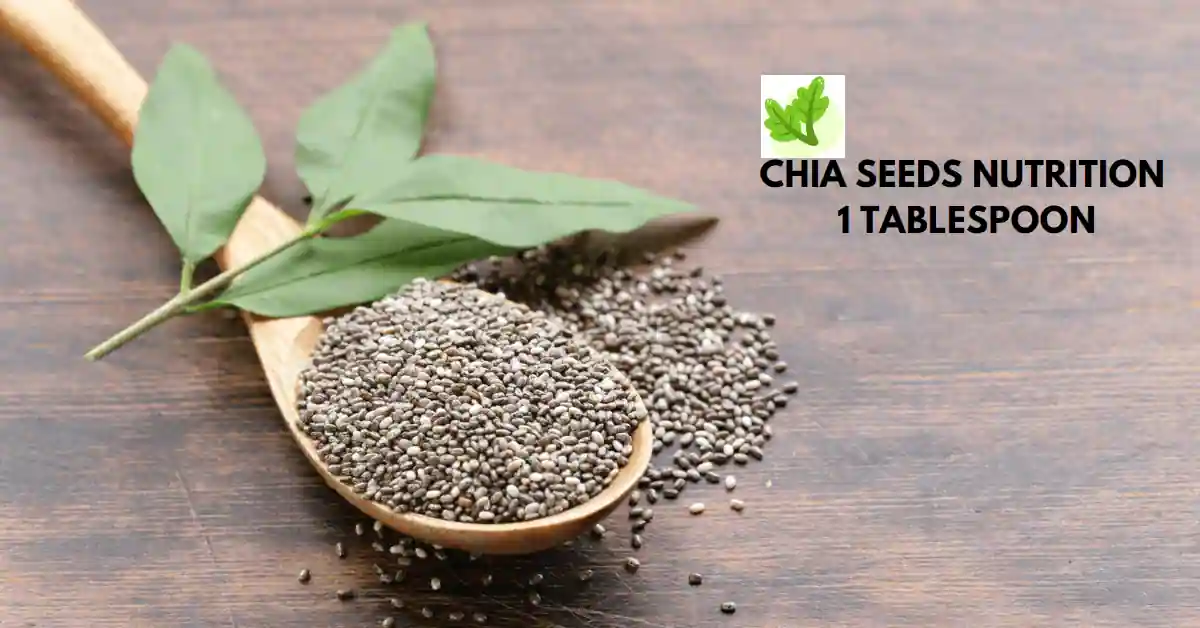
-
Calories and Macronutrients
– Calories: A tablespoon of chia seeds contains approximately 58 calories, making it a low-calorie addition to your diet.
– Fat: Chia seeds are rich in healthy fats, with one tablespoon providing around 4 grams of fat. These fats predominantly consist of omega-3 fatty acids, known for their anti-inflammatory properties and numerous health benefits.
– Carbohydrates: A tablespoon of chia seeds contains around 5 grams of carbohydrates, including dietary fiber and sugars.
– Fiber: Chia seeds are an excellent source of dietary fiber. You get approximately 5 grams of fiber in just one tablespoon, contributing to better digestion, weight management, and overall gut health.
– Protein: Chia seeds are a surprisingly good source of plant-based protein. Around 2 grams of protein per tablespoon can be a valuable addition to a vegetarian or vegan diet.
-
Vitamins and Minerals
– Calcium: Chia seeds are a great plant-based source of calcium, providing approximately 77 milligrams per tablespoon. Calcium is essential for maintaining strong bones and teeth and plays a role in nerve function and muscle contraction.
– Phosphorus: With around 58 milligrams of phosphorus per tablespoon, chia seeds contribute to healthy bone formation, energy production, and cell repair.
– Magnesium: Chia seeds are rich in magnesium, an essential mineral involved in over 300 biochemical reactions in the body. One tablespoon contains around 47 milligrams of magnesium, supporting nerve function, muscle health, and regulating blood pressure.
– Iron: Chia seeds are a good source of iron, offering approximately 1 milligram per tablespoon. Iron is vital for oxygen transport and plays a key role in preventing anemia.
– Potassium: One tablespoon of chia seeds contains around 58 milligrams of potassium, an essential mineral for maintaining fluid balance, regulating blood pressure, and supporting heart health.
Chia seeds are a true nutritional powerhouse; incorporating them into your diet can provide various health benefits. With their impressive nutritional profile, including fiber, healthy fats, vitamins, and minerals, chia seeds can support heart health, weight management, digestion, and overall well-being. So, embrace the power of these tiny seeds by adding them to your favorite recipes and reaping the rewards of their nutritional goodness.
Side Effects of Chia Seeds: Understanding Potential Concerns
What are the side effects of chia seeds? Chia seeds have gained widespread popularity for their numerous health benefits and nutritional value. While they are generally considered safe for most people, it’s important to be aware of potential side effects or precautions associated with consuming chia seeds. In this article, we will discuss some of the possible side effects and considerations when incorporating chia seeds into your diet. Let’s explore these concerns in detail.
Also Read-Black Caraway Seed (Kalonji) The 1-Secret to Better Health and Happiness-
Possible Side Effects of Chia Seeds
1. Gastrointestinal Discomfort-
Chia seeds are high in dietary fiber; consuming them in large quantities without adequate hydration can lead to gastrointestinal discomfort. The seeds can absorb liquid and form a gel-like substance, which may cause bloating, gas, or even constipation if not consumed with enough water. Drinking plenty of fluids when consuming chia seeds is important to prevent these discomforts.
2. Allergic Reactions-
Although rare, some individuals may experience allergic reactions to chia seeds. Allergies to seeds, including chia seeds, can manifest as itching, swelling, hives, or difficulty breathing. Suppose you are allergic to other seeds, such as sesame or flaxseeds. In that case, it’s advisable to exercise caution when consuming chia seeds and consult with a healthcare professional if needed.
3. Medication Interactions-
Chia seeds have the potential to interact with certain medications due to their high fiber content. The fiber in chia seeds can bind to medications, affecting their absorption and effectiveness. Suppose you are taking any medications, especially blood thinners or medications for diabetes. In that case, you must contact your doctor before including chia seeds in your diet to avoid negative reactions.
4. Blood Pressure and Blood Sugar Concerns-
Chia seeds may have a slight blood-thinning effect due to their omega-3 fatty acid content. While this is generally beneficial for cardiovascular health, individuals taking blood-thinning medications should exercise caution and consult their healthcare provider before incorporating chia seeds into their diet.
Furthermore, chia seeds may have a slight impact on blood sugar levels. While they have a low glycemic index, when ingesting chia seeds, people with diabetes should regularly monitor their blood sugar levels and, if required, change their medication or insulin dosage.
Precautions and Considerations-
To lower the risk of negative effects and ensure the safe consumption of chia seeds, consider the following precautions:
1. Stay Hydrated-
Drink adequate water when consuming chia seeds to prevent gastrointestinal discomfort and promote proper digestion.
2. Start with Small Amounts-
If you’re new to chia seeds, start with a small amount and gradually increase your intake to allow your body to adjust.
3. Talk to Your Healthcare Provider-
If you have any underlying health conditions, take medications, or have known allergies, consult your healthcare provider before incorporating chia seeds into your diet.
4. Listen to Your Body-
How your body react to chia seeds? If you experience any adverse effects, discontinue use and seek medical advice if needed.
While chia seeds offer numerous health benefits and are generally safe for consumption, It’s critical to be informed about possible side effects and safety measures. Gastrointestinal discomfort, allergic reactions, medication interactions, and considerations for blood pressure and blood sugar levels should be considered. By following the recommended precautions and listening to your body, you can enjoy chia seeds’ benefits while minimizing potential risks.
How to Select, Store, and Use Chia Seeds
When purchasing chia seeds, choosing a reputable brand that ensures quality and freshness is essential. Look for organic options to minimize exposure to pesticides. Chia seeds should be kept in an airtight jar in a cold, dry area to keep freshness and prevent spoiling. Chia seeds can be incorporated into various dishes, such as smoothies, yogurt, baked goods, and puddings, to add a nutritional boost.
Delicious Ways to Include Chia Seeds in Your Diet
Incorporating chia seeds into your daily diet can be enjoyable and versatile. Here are some delicious ideas to include chia seeds in your meals and snacks:
1. Chia Pudding: Mix chia seeds with your favorite plant-based milk, sweetener, and flavorings. Allow the mixture to sit for a few hours or overnight, and enjoy a creamy and nutritious pudding.
2. Smoothie Booster: Add a tablespoon of chia seeds to your favorite smoothie recipe for added fiber, protein, and omega-3 fatty acids.
3. Baked Goods: Replace eggs with a chia seed gel (mix 1 tablespoon of chia seeds with 3 tablespoons of water) in your baked goods for a vegan-friendly and nutrient-rich alternative.
4. Salad Toppings: Sprinkle chia seeds on top of salads to add a crunchy texture and boost the nutritional value.
5. Homemade Energy Bars: Combine chia seeds with nuts, dried fruits, and sweeteners to create nutritious, energy-boosting bars.
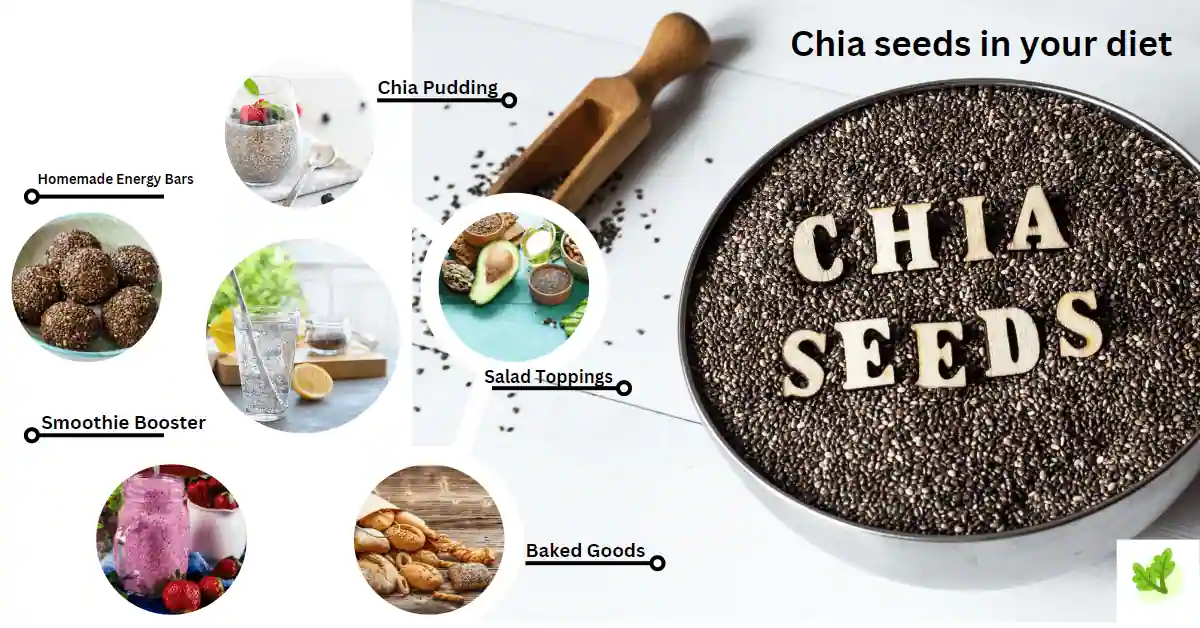
Remember to experiment with different recipes and find creative ways to incorporate chia seeds into your meals for maximum enjoyment and health benefits.
Also Read-
What is Yellow Watermelon? The Colorful World of Watermelons-
Conclusion–
Including chia seeds in your diet can positively affect your health. Chia seeds are a nutrient-packed superfood from weight management and heart health to improved digestion and stronger bones. Whether you sprinkle them on your yogurt, blend them into smoothies, or create delicious chia pudding, there are countless ways to enjoy eating chia seeds benefits. Embrace the power of chia seeds and nourish your body for optimal health and well-being.
Hi there! I’m content writer and blogger. With over two years of experience, I’ve shared my passion for writing across various platforms. I firmly believe in the transformative power of words and look forward to sharing this journey with you. Enjoy my work!
